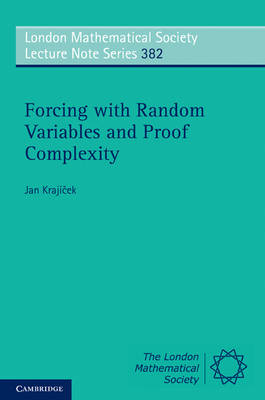
Forcing with Random Variables and Proof Complexity
Cambridge University Press (Verlag)
978-0-521-15433-8 (ISBN)
This book introduces a new approach to building models of bounded arithmetic, with techniques drawn from recent results in computational complexity. Propositional proof systems and bounded arithmetics are closely related. In particular, proving lower bounds on the lengths of proofs in propositional proof systems is equivalent to constructing certain extensions of models of bounded arithmetic. This offers a clean and coherent framework for thinking about lower bounds for proof lengths, and it has proved quite successful in the past. This book outlines a brand new method for constructing models of bounded arithmetic, thus for proving independence results and establishing lower bounds for proof lengths. The models are built from random variables defined on a sample space which is a non-standard finite set and sampled by functions of some restricted computational complexity. It will appeal to anyone interested in logical approaches to fundamental problems in complexity theory.
Jan Krajíček is a Professor of Mathematical Logic at Charles University in Prague. He is currently also affiliated with the Academy of Sciences of the Czech Republic.
Preface; Acknowledgements; Introduction; Part I. Basics: 1. The definition of the models; 2. Measure on β; 3. Witnessing quantifiers; 4. The truth in N and the validity in K(F); Part II. Second Order Structures: 5. Structures K(F,G); Part III. AC0 World: 6. Theories IΔ0, IΔ0(R) and V10; 7. Shallow Boolean decision tree model; 8. Open comprehension and open induction; 9. Comprehension and induction via quantifier elimination: a general reduction; 10. Skolem functions, switching lemma, and the tree model; 11. Quantifier elimination in K(Ftree,Gtree); 12. Witnessing, independence and definability in V10; Part IV. AC0(2) World: 13. Theory Q2V10; 14. Algebraic model; 15. Quantifier elimination and the interpretation of Q2; 16. Witnessing and independence in Q2V10; Part V. Towards Proof Complexity: 17. Propositional proof systems; 18. An approach to lengths-of-proofs lower bounds; 19. PHP principle; Part VI. Proof Complexity of Fd and Fd(+): 20. A shallow PHP model; 21. Model K(Fphp,Gphp) of V10; 22. Algebraic PHP model?; Part VII. Polynomial-Time and Higher Worlds: 23. Relevant theories; 24. Witnessing and conditional independence results; 25. Pseudorandom sets and a Löwenheim–Skolem phenomenon; 26. Sampling with oracles; Part VIII. Proof Complexity of EF and Beyond: 27. Fundamental problems in proof complexity; 28. Theories for EF and stronger proof systems; 29. Proof complexity generators: definitions and facts; 30. Proof complexity generators: conjectures; 31. The local witness model; Appendix. Non-standard models and the ultrapower construction; Standard notation, conventions and list of symbols; References; Name index; Subject index.
| Erscheint lt. Verlag | 23.12.2010 |
|---|---|
| Reihe/Serie | London Mathematical Society Lecture Note Series |
| Zusatzinfo | Worked examples or Exercises |
| Verlagsort | Cambridge |
| Sprache | englisch |
| Maße | 152 x 228 mm |
| Gewicht | 380 g |
| Themenwelt | Mathematik / Informatik ► Informatik ► Theorie / Studium |
| Mathematik / Informatik ► Mathematik ► Logik / Mengenlehre | |
| ISBN-10 | 0-521-15433-2 / 0521154332 |
| ISBN-13 | 978-0-521-15433-8 / 9780521154338 |
| Zustand | Neuware |
| Haben Sie eine Frage zum Produkt? |
aus dem Bereich


